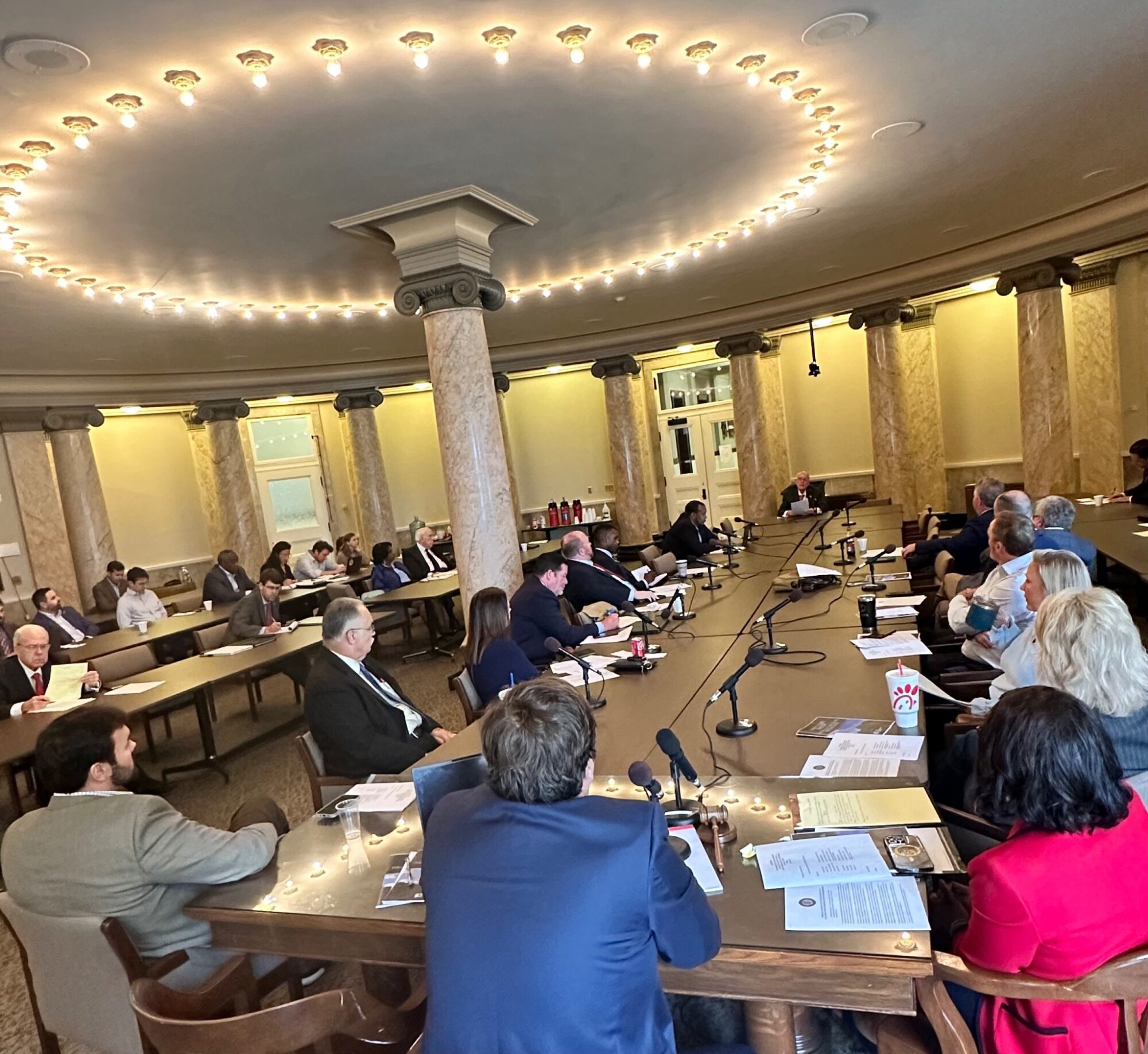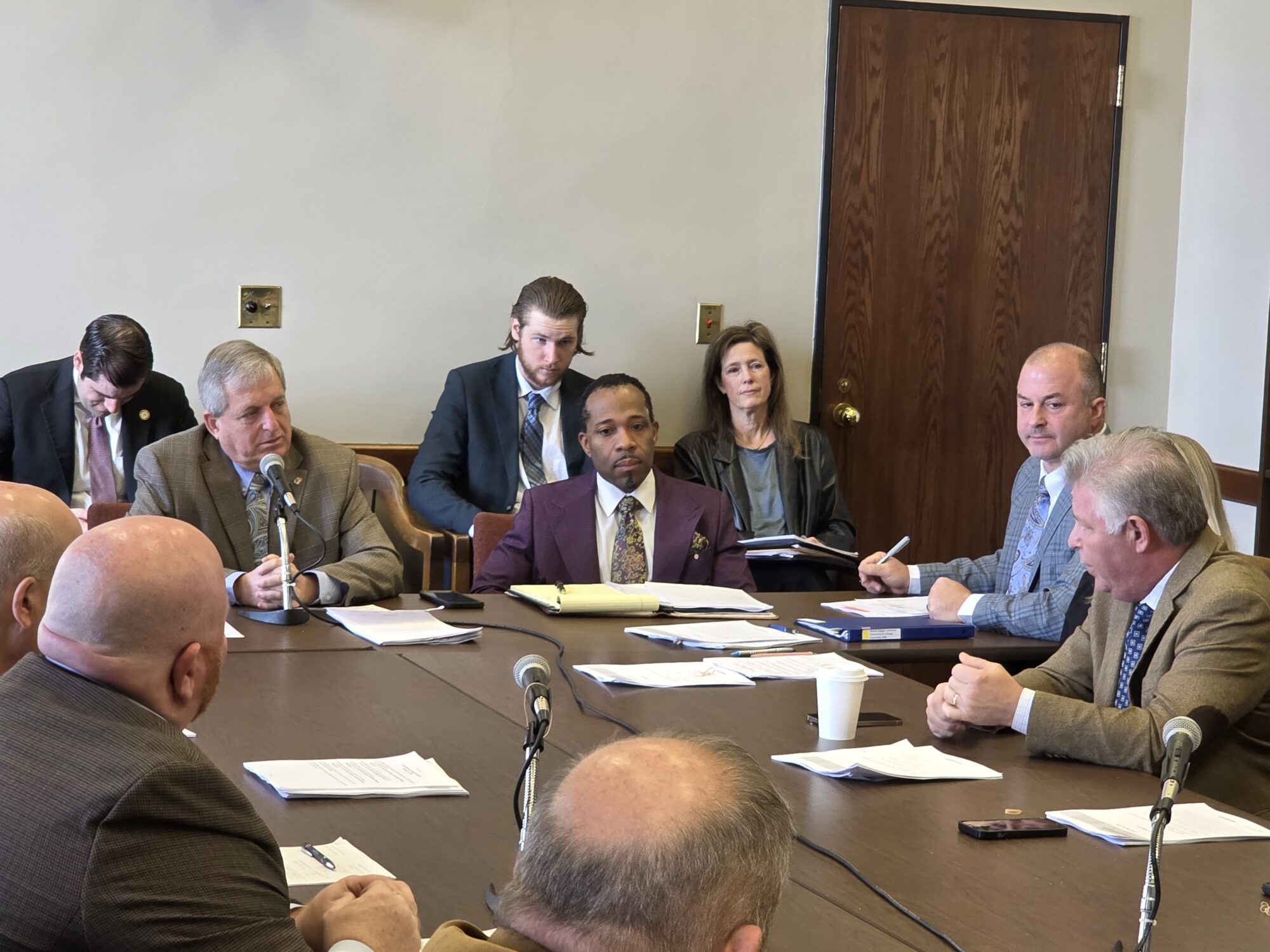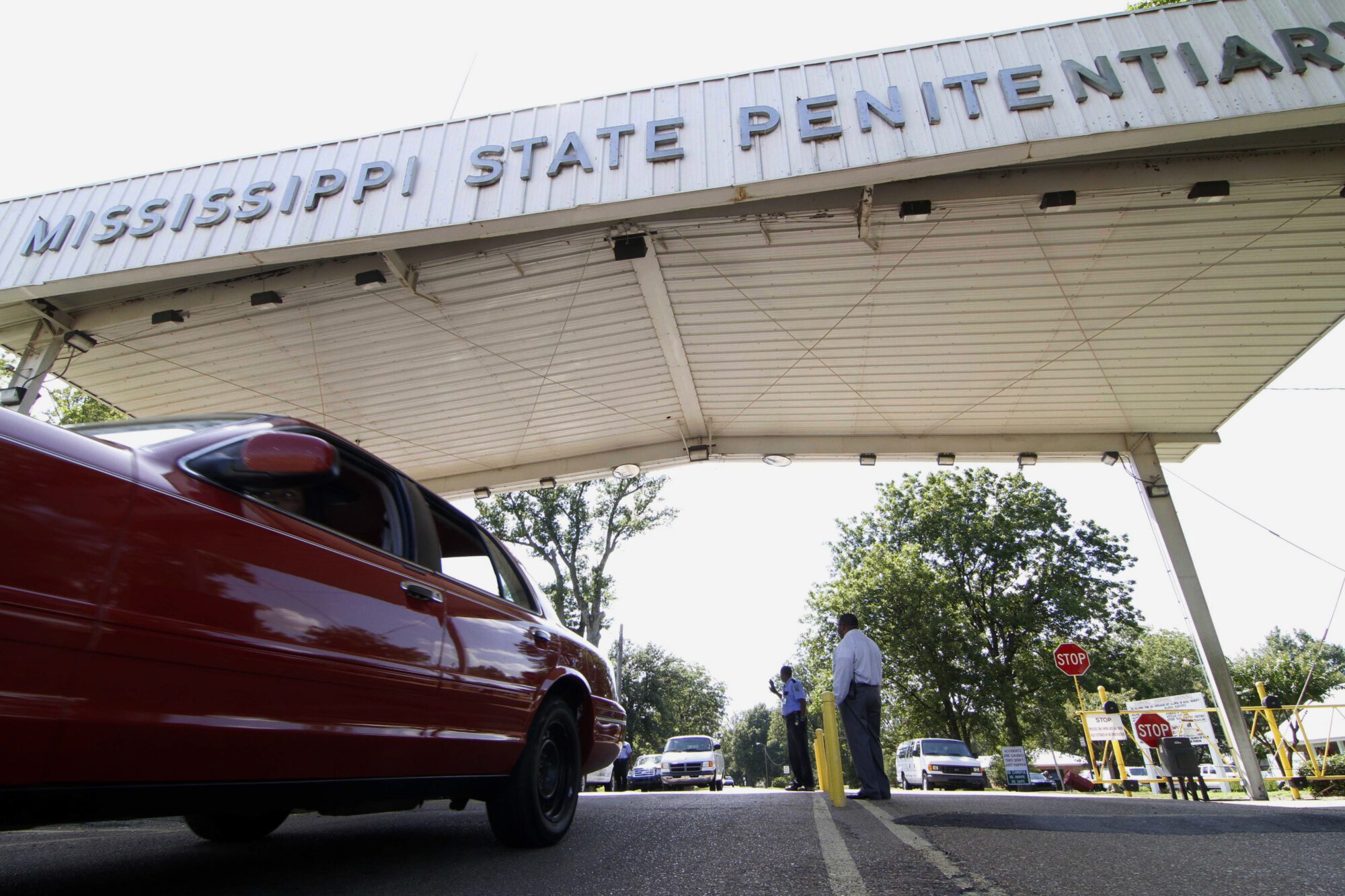
(Photo from State Rep. Nick Bain's X feed)
Low pay and a lack of oversight are some of the issues that need attention when lawmakers look to improve the public defense system in the Magnolia State, witnesses tell legislators.
Public defense is an area of Mississippi’s criminal justice system that needs major reforms to bring it up to par with the state’s prosecution system. The disparity is not just in pay but also in staffing.
That was one of several messages shared during Thursday’s House Judiciary B Committee hearing chaired by outgoing State Representative Nick Bain (R-HD 2). Bain lost his bid for re-election and will not be returning to the Legislature when they gavel in come January 2024.
During the hearing, lawmakers heard from professionals about the need for public defenders to assist indigent defendants in court cases, and the disparity in pay that leads to those lawyers leaving for higher paying jobs. Gail Lowery, with the Hinds County Public Defender’s office, has dealt with that problem firsthand.
When Lowery was appointed to her current position in 2020, on her first day, she found a letter of resignation in her chair from one of the office’s top litigators. The letter explained he was leaving after five years to make more money.
“I wish I could tell you that that was the only letter of resignation that I’ve received as I’ve sat in that office for four years,” Lowery said.
Of the 11 positions in the office at the time, 10 attorneys resigned during her tenure, most of which cited financial reasons, Lowery said. The most recent resignation took place in August of this year. That attorney left to take a job with the Hinds County District Attorney’s office making $35,000 more than Lowery’s office could pay, and she was not the only one, Lowery said.
“The American Bar Association said there should be parity with the District Attorney’s Office because they’re on one side, and we’re on the other side,” Lowery said.
John Colette, an attorney who has been practicing in the state for 40 years, called for the Legislature to put public defenders on par with the state’s prosecutors.
“The poorest people need the best attorneys, and they can’t afford them,” said Colette, adding, “They have seminars, bar convention stuff, they got investigators, witness coordinators, they got coordinators for the coordinators. In the public defender’s office, you got maybe a guy a year out of law school.”
He pleaded with the committee to form a unified system to be able to provide qualified representation to the people who need it most.
“Let’s at least try to serve the most needy in the state of Mississippi, and that’s our indigent people who get accused of a crime,” Colette said.
An ineffective defense can lead a defendant to accept a plea deal that will result in consequences the defendant does not understand at the time, such as losing their right to possess and own a gun and being unable to find gainful employment again, said David Carroll, Executive Director of the Sixth Amendment Center.
The problem is exacerbated when District Attorney offices are approved to hire more staff, while public defender offices are kept at the same budget levels.
Lowery said starting pay for a public defender in her office is $64,000, but other offices such as the Attorney General’s office can offer $90,000. Her office was denied a requested increase from her current $2.3 million total budget to bring about parity with the District Attorney’s office.
“Any given attorney may have 150 cases. When I get that resignation that’s 150 clients who just lost their lawyer. So, we’re scrambling to make sure that somebody who needs to be at arraignment, that needs representation, that we are on that with limited staff because retention, recruitment is an uphill battle,” Lowery said.
The Hinds County Public Defender’s office did receive state funding to hire three more lawyers as part of the passage of HB 1020, bringing her total staff to 14. That office, the largest public defender’s office in the state, has a current total case load of 4,000.
Mississippi Supreme Court Justice Jim Kitchens agreed the Legislature needs to do more to ensure pay scales are adjusted, saying that while prosecutors deserve to make more, in the case of public defenders it’s, “another story.”
“The playing field is far from level. You are the great levelers and I call on you to do what you can to make things as they should be,” Kitchens said.
Not only are public defenders taking positions as prosecutors, some are leaving the state to work elsewhere.
Spencer Cash, president of Magnolia Defenders at the University of Mississippi said Kentucky, Tennessee, Georgia, Florida, Alabama, California and New York have attracted a lot of Mississippi’s law students to be public defenders. He said when students look at the disparity in pay scales, it appears evident that the role of public defender is not as valuable in Mississippi’s eyes.
“If you build it, we will come and people will come because right now we’re leaving,” Cash said.
A lack of oversight was also discussed at the hearing.
Carroll presented data collected as part of a 2018 report that shows the state has deficiencies in the public defense sector, but the state is unaware which ones are deficient due to that lack of oversight. The problem is the 450 public defense services for the indigent across Mississippi, while neighboring states such as Louisiana, Alabama and Arkansas have one each.
“When services are out of sight, out of mind, bad things happen,” Carroll said.
Most counties, 63 of the 82, are currently providing private practice lawyers a flat fee to be public defenders part-time, regardless of how many cases they work and how much time is invested into them throughout the year.
The lack of oversight could also put the state, counties or cities in a position where a class action lawsuit is filed. Some counties have been sued for providing inadequate public defense, such as Scott and Chocktaw counties, said State Public Defender André de Gruy.
If the state sets those standards before the federal government gets involved, the state will have the freedom to establish a system that takes geography and court cultures into consideration, Carroll said.
The House committee also discussed the dead zone between the time an indigent person is arrested to the time they see their attorney for the first time. Carroll said that dead zone leads to a loss of witnesses and evidence not being recovered. Another issue he sees entails some attorneys being afraid to file motions in fear of angering a judge by slowing progress in the case.
“There is no bigger tyranny than when government takes away defense by not providing an effective lawyer,” Carroll said.
Lowery said her staff makes an effort to be with the defendant within 48 hours of their arrest.
“When you have attorneys who are passionate and good at what they do, and there is an opportunity to shore up the constitutional right that is given, we as public defenders take that extremely seriously,” Lowery said.
The higher courts, such as circuit, typically do not see a defendant until they are indicted or enter a plea. As such, Harrell said to address the dead zone in his court is difficult because he does not see the defendant until that time.
Justice Kitchens said the courts need to collaborate to ensure the defendant is aways in touch with a lawyer.
“Justice courts and circuit need to collaborate because there is a disparity of prosperity among our counties,” Kitchens said.
Harrell agrees that indigent defendants need faster access to their lawyer so they do not stay in jail any longer than necessary, but in his district’s more rural areas, that county’s grand jury may only meet twice a year.
“So if someone commits a crime and is indigent, they may wait six months in jail. Period,” Harrell said.
The problem is worsened if the crime lab takes a long time to analyze evidence. Harrell said at times even if the case gets to the grand jury, it may have to be pushed back another six months because the crime lab has not completed its analysis of the evidence. That additional time in jail is not only hard on the defendant, but the taxpayers. In Lamar County, he said it costs $90 per day to house a defendant.
“That can run into some serious money, particularly if you got five jails,” Harrell said.
In addition to the expense of housing a defendant, there is the issue of medical care. Medical expenses last year at the Lamar County Jail totaled $680,800, he said.
“That’s just the medical. And unfortunately, many people who have been indigent, they don’t take care of themselves. They may have diabetes, heart troubles, they may have a lot of issues,” Harrell said. “And the counties have to pay that when they’re locked up.”
Rep. Bain, who is also a lawyer and part-time public defender, asked Harrell how he determines whether a defendant is indigent. Bain noted that he does not see a system in place within the First Judicial District to determine if a defendant truly needs assistance.
“I cannot tell you how many that I had that drive a better car than I do,” Bain said.
Within the 15th Judicial District, especially in the more rural counties, Harrell said he requires the defendant to file an affidavit that he reviews during arraignment. If they are found to be lying, the defendant can be found in contempt or guilty of perjury.
Currently, Mississippi is dead last in the amount of money spent per person for public defense, at an average rate of $9.80 per person. Carroll said the national average is about $20. For comparison, Louisiana spends $16, Tennessee spends $18, and Alabama spends $13.
If Mississippi reached the same level as Alabama, Carroll estimates it would cost an additional $23 million. Those figures only reflect felony cases, he added.
Harrell said within his district there are three counties with part-time public defenders, Jefferson Davis, Lawrence and Marion. In those counties about $9.90 was spent per person on indigent public defense. In the other two counties, Pearl River and Lamar, there are full-time public defenders. The expense per indigent person in those counties was $1.50.
The 15th Judicial District of Mississippi reflects the disparities in various counties. Of the five counties in his district, Harrell said Lamar and Pearl River are dramatically different than the other three because they are growing while the others are losing population. The part-time counties have a total population of 47,000, while Pearl River County and Lamar collectively have about 120,000 people.
Within Pearl River County, Harrell attributed the population growth to an influx of people after Hurricane Katrina, combined with a multi-million-dollar investment by Forrest Health to build a new hospital in Picayune. Harrell also cited the jobs offered at nearby Stennis Space Center. Counties with more population can afford to hire a full-time public defender and additional staff, while the poorer counties can afford only a part-time public defender.
Continued work by this committee will pass to another chair in January. Bain lost the Republican party runoff in September to Brad Mattox. Mattox is unopposed in next month’s general election. At the end of the committee meeting, Bain asked his fellow lawmakers to not be politicians when the next session starts, but to be Mississippians.
“Today I presided over my last Judiciary B committee In Jackson,” Bain posted on X (formerly Twitter). “It has been one the highest honors of my life to work along with these incredible people. This group has made a phenomenal impact on the state of Mississippi… I am grateful for their service and I am a better man because of each of them.”











